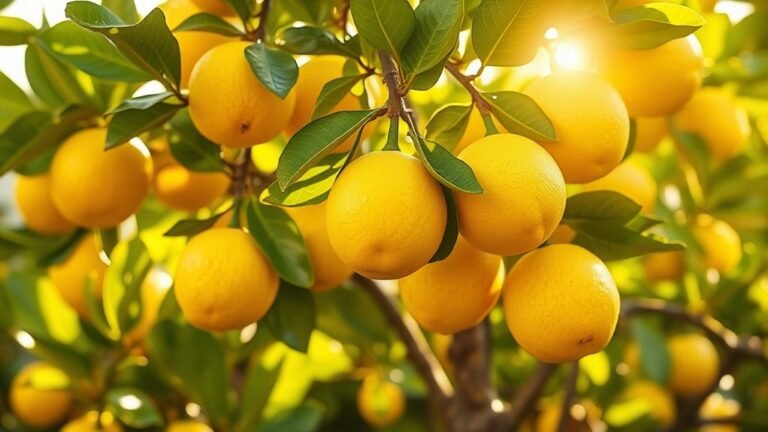12 Spiritual Meanings of Buying Maize
When we consider the act of buying maize, it goes beyond mere sustenance; it's rich with spiritual meaning that reflects our collective values and traditions. Each purchase connects us to our ancestors and strengthens our community ties. It evokes gratitude, reminds us of abundance, and symbolizes fertility and prosperity. Let's explore these intricate layers together, uncovering how something so simple can profoundly impact our lives and relationships. What might we discover about ourselves in this practice?
A Quick Overview
- Buying maize symbolizes nourishment, fostering a sense of community and belonging through shared meals and rituals that reinforce resilience.
- The act connects individuals to ancestry and cultural heritage, preserving traditions and honoring sustainable farming practices passed down through generations.
- Purchasing maize invokes themes of fertility and prosperity, linking participants to the earth's cycles and invoking blessings for growth and abundance.
- Interactions during maize transactions strengthen social bonds, with shared stories and laughter celebrating community identity and reinforcing interconnectedness.
- Buying maize encourages recognition and appreciation of blessings, promoting gratitude and spiritual alignment through acts of giving and intentional offerings.
The Symbol of Nourishment
Maize serves as a powerful symbol of nourishment across various cultures, representing more than just a staple food. It instills a sense of community and belonging, connecting us to shared experiences.
When we gather around maize-based meals, we partake in a ritual that nourishes our spirit and body alike; it illustrates divine sustenance, manifesting in the warmth of shared traditions. In many cultures, maize is revered not just as a dietary necessity but as a sacred element that fosters connection and unity.
As we harvest and consume maize, we celebrate its role in our lives—it's a reminder of our shared humanity and interdependence. By honoring maize, we strengthen our bonds and elevate our collective nourishment.
A Connection to Ancestry
While we relish the taste of maize in our meals, it also serves as a profound link to our ancestry. This humble grain carries with it the weight of our cultural heritage and ancestral wisdom, reminding us of those who came before us. As we savor each bite, we acknowledge the stories and traditions embedded within.
- It symbolizes our communal ties, often shared during family gatherings.
- It connects us to our ancestors' sustainable farming practices.
- It encapsulates rituals, reinforcing our spiritual beliefs.
- It transcends generations, bridging the past and present.
In the act of buying maize, we embrace our roots, finding belonging in the richness of our shared history and the continuity of life it represents.
The Representation of Fertility
For many cultures, maize isn't just a staple food; it's a potent symbol of fertility and abundance.
When we gather to partake in maize rituals, we connect deeply with the earth and its cycles, reminding ourselves of life's inherent potential. The vibrant kernels we nurture aren't merely sustenance; they embody fertility symbolism, essential for personal and communal growth.
As we share this sacred grain, we create bonds that transcend generations, invoking blessings for fertility—both of the land and our families. Each ear of maize we buy or grow reinforces our commitment to life and prosperity, fostering a sense of belonging.
Through our collective rituals, we not only honor the maize but also celebrate our shared aspirations for abundance and continuity.
A Reminder of Abundance
The vibrant hues of maize remind us of the abundance that surrounds us in nature and within our communities. Each time we purchase maize, we awaken an abundance mindset and embrace a gratitude practice. This simple act encourages us to recognize the plentiful gifts life offers.
Here are some reflections to deepen our connection:
- Maize represents nourishment, both physical and spiritual.
- It's a symbol of community resilience through sharing especially during harvests.
- The varieties of maize remind us of diversity's beauty.
- Every kernel echoes our gratitude for what we have, while inspiring hopes for what's to come.
Strengthening Community Bonds
Each encounter with maize not only nourishes our bodies but also cultivates connections within our communities.
When we gather to buy maize, we're participating in a vibrant tapestry of community support. Here, every shared kernel symbolizes our collective values—whether it's gratitude, unity, or tradition.
As we exchange stories and laughter among neighbors, we reinforce the bonds that tie us together. This simple act of purchasing maize transcends mere commerce; it's a celebration of who we're as a community.
It reminds us that we're not alone on this journey; our connections to each other and our shared values strengthen our social fabric.
Together, we create a sense of belonging that enriches our lives and upholds the spirit of kinship.
An Offering to the Earth
Buying maize acts as a powerful offering to the Earth, reflecting our deep-rooted relationship with nature. Each kernel we purchase embodies a commitment to nurturing our soil connection and honoring the planet that sustains us.
Here are the ways we can view maize as an earth offering:
- Nourishment: It provides essential sustenance, connecting us to the cycles of growth.
- Tradition: Purchasing maize aligns with cultural rituals, honoring our ancestors.
- Respect: It fosters gratitude for nature's bounty and reminds us of our responsibilities.
- Community: Sharing maize strengthens our collective bond and deepens our communal ties.
When we buy maize, we participate in a sacred act that reinforces our love for the Earth and our shared existence within this vibrant ecosystem.
The Cycle of Life and Death
While engaging with maize, we inevitably confront the profound cycle of life and death that it represents. For many cultures, maize isn't just food; it symbolizes fertility and sustenance, integral to life cycles.
Each kernel reflects our shared journey, from planting seeds to harvesting bounty, mirroring our own growth and eventual return to the earth. In death rituals, maize often holds a sacred role, honoring those who've passed, connecting our past with the present.
This common bond unites us as we honor ancient traditions and acknowledge the inevitability of life's changes. Whenever we buy maize, we participate in this sacred cycle—affirming that life, death, and rebirth are inextricably linked, weaving our experiences into something greater than ourselves.
A Medium for Rituals
The deep ties maize has with life and death extend into the domain of ritual practices, highlighting its role as a powerful medium in various cultural ceremonies.
We recognize its ritual significance through:
- Ceremonial Offerings: Maize is often presented to deities during festivals, symbolizing gratitude and respect.
- Life Events: It plays an essential role in rites of passage, marking births, weddings, and funerals.
- Healing Practices: In some cultures, maize is used to create amulets or medicines during healing rituals.
- Community Bonding: The act of preparing and sharing maize fosters a sense of belonging and unity among participants.
The Embodiment of Prosperity
Maize transcends mere sustenance; it embodies prosperity across many cultures. For us, the maize symbolism resonates deeply as a symbol of abundance and growth.
When we buy maize, we're participating in a rich tradition that connects us to our ancestors who revered this staple. It reflects a prosperity mindset, reminding us that each kernel is a promise of nutrition and bounty.
As we gather and share maize in our communities, we reinforce bonds and nurture our collective identity. This unbroken cycle of giving and receiving transforms simple purchases into sacred acts; we're not just filling our plates but also manifesting our hopes for a fruitful future.
Together, we embrace maize not merely as food, but as a crucial part of our shared journey towards prosperity.
A Vehicle for Cultural Expression
Buying maize serves not only as a means to nurture our bodies but also as a vibrant canvas for expressing our cultural identities. When we purchase this staple, we connect with our community and honor our cultural traditions.
It's a reminder of our spiritual heritage, bringing together generations through shared practices.
Here are some ways we embrace this cultural connection:
- Ceremonies: We use maize in rituals that celebrate life and harvest.
- Recipes: Traditional dishes highlight our heritage and pass down stories through flavors.
- Gatherings: Sharing maize at social events strengthens bonds within families and communities.
- Artistry: We craft unique decorations using maize, reflecting our creative expressions.
Through these acts, buying maize transcends mere consumption; it becomes a reflection of who we are.
The Spiritual Significance of Sharing
Sharing represents an essential thread woven into the fabric of our spiritual lives. As we engage in sharing traditions, from giving maize at communal feasts to exchanging stories with neighbors, we strengthen our bonds and cultivate a sense of belonging.
These acts of generosity aren't just about the physical exchange; they embody deeper communal blessings that enhance our collective spirit. When we share, we honor our ancestors and create a space for interconnectedness.
This connection enriches our understanding of community, reminding us that every offering, no matter how small, can ignite joy and hope. As we embrace these shared moments, we invite abundance and create a harmonious atmosphere that fosters unity, resonating with the profound meaning behind our actions.
A Token of Gratitude
In our communal gatherings and rituals, we often find ourselves presenting maize as a heartfelt offering, a meaningful act that embodies our gratitude.
This act serves as a bridge, uniting us in shared appreciation and strengthening our bonds. Our gratitude practices, intertwined with offering intentions, reflect a deep-seated cultural reverence.
Here are some key aspects of this tradition:
- Recognition of Blessings: We acknowledge the abundance in our lives.
- Connection: Each grain symbolizes our relationship with the earth and each other.
- Support: We offer maize to those in need, creating a cycle of giving.
- Spiritual Alignment: This offering aligns our intentions with the greater good.
Through these shared gestures, we cultivate belonging and gratitude in our community.
Frequently Asked Questions
How Does Buying Maize Affect One's Personal Spirituality?
When we buy maize, we're not just purchasing food; we're cultivating intentions for personal growth. This simple act connects us to our community, reminding us of shared values and our journey towards fulfillment together.
Are There Specific Rituals Associated With Purchasing Maize?
Yes, when we purchase maize, we often engage in rituals that honor its cultural significance. These maize offerings strengthen our communal bonds, reminding us of our shared heritage and the importance of nourishment in our lives.
What Colors of Maize Hold Different Spiritual Meanings?
When we explore colors of maize, we find yellow maize symbolizes prosperity and abundance, while blue maize represents harmony and spirituality. These meanings connect us deeply to our cultural roots and shared experiences, enriching our communal journey.
Can Maize Buying Influence Financial Prosperity?
Buying maize can embody maize symbolism, fostering an abundance mindset in our lives. Together, we believe our choices reflect our desires, positively influencing our financial prosperity and creating a sense of unity and shared intention.
How Does Maize Relate to Modern Spiritual Practices?
In modern spiritual practices, we embrace maize symbolism as a representation of spiritual abundance. By acknowledging its cultural significance, we foster a sense of belonging, connecting with our roots and each other in meaningful ways.

Naomi White is an esteemed expert in spirituality with a passion for uncovering the hidden meanings and messages within divine symbols. Naomi’s work aims to bridge the gap between the mystical and the everyday, helping others find guidance and inspiration in the symbols that surround us all.







